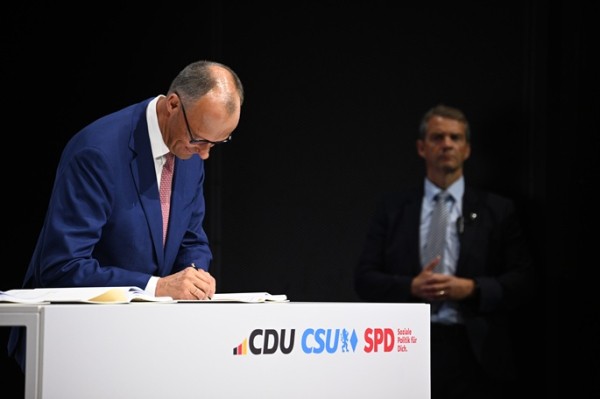
Germany's incoming chancellor Friedrich Merz on Monday pledged to turn the country's fortunes around as he signed a coalition agreement in Berlin, paving the way for his government to take office.
"I am very confident that we will succeed in governing our country from tomorrow with strength, planning and trust," Merz said at a ceremony to ratify the deal between his conservative bloc and the centre-left Social Democrats (SPD).
Merz is set to be elected as chancellor on Tuesday in the lower house of parliament, or Bundestag, less than three months after his centre-right alliance — made up of the Christian Democrats (CDU) and the Bavaria-only Christian Social Union (CSU) — won February's parliamentary elections.
The 69-year-old said his incoming administration will implement the policies outlined in the 144-page coalition deal in order to "turn things around in Germany for the good."
SPD co-leader Lars Klingbeil, who is set to become vice chancellor and finance minister, promised the new government would get to work quickly to kick-start economic growth, invest in the future and improve security.
In the face of a changing world order, Germany's new administration will "react with responsibility, with clarity, with achievement and with a coalition agreement that will take [Germany] forward," Klingbeil said.
The comments were echoed by CSU chief Markus Söder, the premier of Bavaria, who said the country's partners should know that Germany is "ready to take responsibility" under its new leadership.
Together, the three parties hold 328 seats in the 630-seat Bundestag, with Merz requiring an absolute majority of 316 votes to replace outgoing chancellor Olaf Scholz on Tuesday.
Once Merz is elected and his Cabinet sworn in, the new administration can get to work, exactly six months after Scholz's three-party coalition imploded, triggering early elections.
The incoming government faces a long list of pressing challenges, from Germany's ailing economy and crumbling infrastructure to the threat to European security from Russia and an ever-more abrasive US president.
It must also deal with the sensitive question of how to deal with the far-right Alternative for Germany (AfD), which finished second in February's vote and was designated last week as a "confirmed right-wing extremist" organization by a domestic intelligence agency.
SPD presents ministerial line-up
Also on Monday, the SPD revealed its ministerial line-up for the incoming Cabinet, with Defence Minister Boris Pistorius the only person to retain his position from Scholz's team.
The centre-left party, traditionally one of the two main political forces in Germany, fell to third place in February's election after a difficult period in office under Scholz's unhappy three-way coalition.
But with centrist parties ruling out cooperation with the AfD — a policy known as the "firewall" — a coalition between the CDU/CSU alliance and the SPD became inevitable despite clashes during the election campaign on issues such as migration and the economy.
After a coalition deal was struck in April, the SPD has emerged with seven of the 17 ministerial positions in the new Cabinet, led by Klingbeil.
"The SPD is putting together a team that is ready to boldly shape our country," the party's leadership said in a joint statement on Monday. "Experienced personalities from federal and state politics meet new faces who stand for the generational change in the SPD."
Four of the incoming SPD ministers are women: Bärbel Bas as labour minister, Verena Hubertz for construction, Reem Alabali-Radovan as development minister and Stefanie Hubig taking on the justice portfolio.
Carsten Schneider is to be the SPD's new environment minister, but there is no place in the Cabinet for Klingbeil's colleague as co-leader, Saskia Esken.
The conservatives outlined their choices last week, with Katherina Reiche as economy minister and the CSU's Alexander Dobrindt taking the interior portfolio.
Scholz: 'Not going to get rich'
Scholz, meanwhile, is to receive an official send-off later on Monday, with a special military ceremony — known as a tattoo — to be held in his honour in Berlin.
Speaking at an event with schoolchildren in the eastern state of Brandenburg on Monday, the outgoing chancellor said he will not interfere in the work of the incoming administration once he leaves the government.
"I'm not going to get rich. I'm not going to lobby. I'm not going to constantly say on the radio in the morning what the government is doing wrong," said Scholz, who intends to remain in the Bundestag as a lawmaker.
Instead, he said he wanted to contribute to ensuring that the country "continues to do well."
Source: www.dailyfinland.fi


